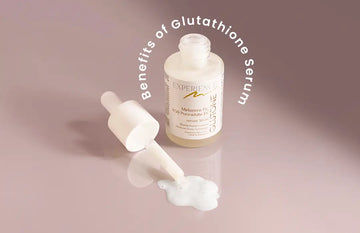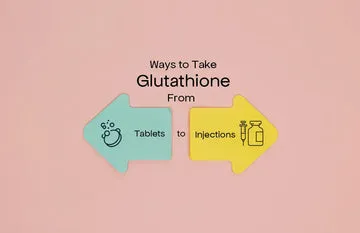What Happens When You Stop Taking Glutathione?
If you’ve been using glutathione supplements to support healthy skin, detoxification or overall wellness, a question may eventually pop up: what happens when you stop taking glutathione? Do the benefits vanish overnight? Will your body notice the absence? Understanding the answer requires a little science and some common sense.
Why Glutathione Matters?

[Fig. 1 - Glutathione recycling process (what happens when glutathione neutralises free radicals)]
Glutathione neutralises free radicals, supports liver detoxification, regulates immune function, and influences protein synthesis and gene expression. Since it’s used continuously, glutathione levels can drop due to stress, poor diet, illness or toxin exposure. Supplements and glutathione-rich foods help restore those levels.
How Glutathione Supplements Work
Glutathione—whether capsules, effervescent tablets or mouth dissolving tablets—provide your body with either ready-made glutathione or the precursors to make more. People often take them to manage oxidative stress or improve skin tone. So, what happens when you stop taking glutathione?
The good news: Glutathione is generally safe and non-toxic, so stopping doesn’t result in withdrawal symptoms. But once you pause your glutathione tablets or other forms of supplementation, your glutathione levels will gradually return to what it was prior to consuming supplements. If your body struggles to produce enough on its own or if you’re under ongoing oxidative stress, you might notice duller skin, lower energy, or slower recovery. That’s the most common answer to what happens when you stop taking glutathione pills: you lose that extra antioxidant advantage.
What Happens When You Stop Glutathione
Not everyone feels the same effects after stopping glutathione. A few key things make the difference:
-
How long you’ve been taking it – Someone who’s taken glutathione for years may notice changes more clearly than someone who tried it for a short period.
-
Dosage and form – Higher doses or advanced delivery methods (like effervescent tablets) tend to give stronger results, so their absence may be felt more.
-
Your body’s natural production – Younger, healthier people produce more glutathione naturally, so they may not see drastic differences when stopping.
-
Lifestyle and diet – People who eat glutathione-rich fruits and foods, exercise, and sleep well may still maintain better levels even without supplements.
How Long Before You Notice Changes?
The timeline differs from person to person.
-
Skin glow or brightness might fade within weeks.
-
Immunity and detox benefits could take a month or more to shift.
-
Energy levels are usually the slowest to change—you may notice tiredness only after consistent low glutathione levels.
In short, it’s a gradual process, not an overnight change.
Possible Effects of Stopping Glutathione Tablets

The effects of discontinuing glutathione are often subtle and vary depending on individual health. Some of the reported effects include:
-
Increased oxidative stress and detox burden
Without the added antioxidant support, free radicals may accumulate and your liver may detox less efficiently. Over time, this could result in fatigue, breakouts, or duller skin tone.
-
Skin-related effects
After stopping glutathione, some people notice increased pigmentation, uneven skin tone, or a duller complexion. In certain cases, breakouts or dryness may also occur as the skin adjusts.
-
Changes in skin texture and elasticity
A reduction in antioxidant protection can lead to subtle changes in skin smoothness, firmness, or brightness over time.
-
Weakened immunity
Since glutathione plays a role in immune regulation, stopping it could make you slightly more prone to infections.
While rare, some experts suggest long-term use could impact zinc levels—consult your doctor to monitor micronutrient status.
Should You Stop Taking Glutathione Suddenly or Gradually?
It’s always better to reduce gradually rather than quit at once. Here’s why:
-
Stopping suddenly can cause a sharp dip in glutathione levels.
-
Gradual reduction gives your body time to adjust.
-
Products like Glutone C (Vitamin C + Glutathione) can be a smart step-down option, maintaining skin and immunity support without high doses.
Glutone 1000 to Glutone C - Gradual Reduction Instead of Complete Discontinuation
If you’ve been taking Glutone 1000 and are thinking about going cold turkey on your glutathione, you might shock your healing body and skin. Instead, the best way to naturally balance the levels of glutathione is to reduce your dose. Consider moving to Glutone C as a step-down option.
Glutone 1000 - Glutathione tablet delivers 600 mg of Setria® L-Glutathione—a highly pure, bioavailable form—plus 400 mg of NAC, in an orange-flavoured effervescent tablet. This formulation boosts the absorption of glutathione, making it effective for skin health and antioxidant support.
Glutone C - Glutathione & Vitamin C, the next best Glutathione tablet with the same effervescent formula as Glutone 1000, offers 500 mg Setria® L-Glutathione and 1000 mg natural vitamin C, also in an orange-flavoured effervescent tablet for high absorption. Vitamin C supports the antioxidant function of glutathione and helps to enhance skin radiance, along with immunity support.
-
Easy-to-dissolve, orange flavour
-
Gentle on the stomach
-
FSSAI approved
-
Backed by dermatologists
For best results, we recommend taking our Glutone effervescent tablets for 3 to 4 months. So, what happens if you stop taking glutathione pills? Stopping abruptly after just a few weeks might not show clear results, so give it time to work or just reduce the dosage with Glutone C or Glutone MD for maintenance.
Can You Maintain the Benefits Without Supplements?
If you choose to pause your Glutone 1000 or other Glutathione tablets, here are ways to keep your glutathione levels steady:
-
Eat glutathione-rich foods
Avocados, spinach, asparagus and broccoli support glutathione production.
Read our Blog: Natural Sources of Glutathione
-
Prioritise rest and exercise
Sleep and physical activity both boost natural antioxidant production.
-
Manage stress
Practices like yoga and meditation help preserve glutathione reserves.
These lifestyle tweaks support your body’s natural detox systems—even if you’ve paused supplementation.
What happens when you stop taking glutathione?
Is not a question about sudden change. It’s about gradual shifts in how your body manages toxins, stress, and oxidative damage. If you’ve been benefiting from supplementation, stopping may reduce your antioxidant reserves. If you choose to pause, support your system with proper food, rest and other supplements that can keep your antioxidant reserve stable.
If you want a reliable supplement to maintain levels, Glutone 1000 or Glutone MD is a trusted, effective option to keep glowing from within.








 Mon to Sat - 10 am to 7 pm
Mon to Sat - 10 am to 7 pm